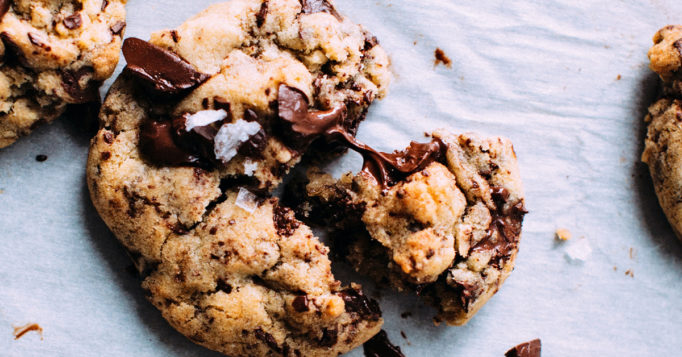
We can all agree on one thing: Nothing beats the smell of fresh-baked chocolate chip cookies.
That is until you eat those cookies. For a majority of folks, when you say “cookie” they think “chocolate chip.” It is also the most popular Christmas cookie and it might also be one of the easiest cookies to make. Of course, there are potential mistakes to be made that would put your cookies in peril.
These are the mistakes to avoid when baking your next batch of chocolate chip cookies:
1. Not Preheating the Oven
Let’s assume that you’ll be following the classic Nestle Tollhouse Chocolate Chip cookie recipe. That recipe calls for preheating your oven to 375 degrees. What happens if you just turn on the oven and slide in the tray before it preheats? The batter will melt much slower preventing it from finishing baking. It can turn out like wet Play-Doh and the cookies will have the same shade of color when you bring them out of the oven as you did when you put them in.
2. Not Softening the Butter
When the butter isn’t softened, it breaks up into chunks and those chunks can remain in the dough. That results in a paler cookie. And without an even fat distribution, the cookie becomes denser. It won’t have that same consistent chewiness with each bite.
3. Adding too Much Butter
Have you ever been tempted to add extra butter to your dough for a more soft texture? Don’t! What happens is the cookie will spread out wider. That can lead it to fall apart more easily. It will also be filled with air pockets.
4. Messing Up Flour Amount
Baking is a science. As such, you need to follow the recipes precisely. With the chocolate chip cookie, if you have extra flour then the dough becomes thick like clay. That makes it very difficult to mix in the coveted chips. With less flour, they spread out far and can become misshapen.
5. Using Baking Powder Instead of Baking Soda
Baking powder and baking soda seem like the same thing but they’re not. Baking soda is for the recipe. Substituting baking powder can result in a cookie that tastes less sweet. It can also become less chewy and airier like cake.
6. Doubling the Chips
Finally, if you double the chips, then you’re lessening the amount of batter per cookie. That means less spread when they bake. That extra fat might also make those cookies greasier. You just have to find the right amount for your cookie fans.

